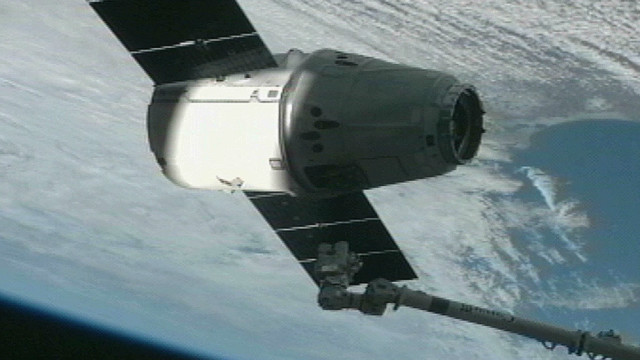Story highlights
- Elon Musk: Commercial space flight won't be affordable without reusable rockets
- CEO of SpaceX gives keynote at South by Southwest Interactive festival
- The SpaceX Dragon is currently docked at the International Space Station
- Musk also is CEO and chief designer at Tesla Motors, maker of electric cars
The future of space travel will depend on our ability to make rockets that can be used more than once, says SpaceX CEO Elon Musk. And on Saturday, he gave a crowd at the South by Southwest Interactive festival the world's first look at a step in that direction.
Musk, whose SpaceX Dragon is currently docked on the International Space Station, showed a packed exhibit hall a two-day-old video of Grasshopper, an experimental rocket. If fully realized, the rocket would propel spacecraft out of the earth's atmosphere, then flip around, sprout landing gear and return intact to the launch pad.
In the video, a 10-story-high Grasshopper rocket did just that -- except for the leaving-the-atmosphere part. It blasted off, hovered, and then set itself down at virtually the same spot where it began. The video, with its Johnny Cash "Ring of Fire" soundtrack, drew cheers from the crowd.
Friday wasn't the first time Grasshopper has left the ground, but it was the most ambitious test to date, Musk said.
"With each successive test, we want to go higher and further," he said.
Musk, a festival keynote speaker, made his fortune as the founder of Paypal. From there, he's taken on private spaceflight as CEO of SpaceX, electric vehicles as CEO and chief designer of Tesla Motors, and solar energy as chairman of Solar City.
"Elon may be the planet's most exciting entrepreneur," said SXSW Interactive director Hugh Forrest.
During a question-and-answer session with "3D Robotics" editor-in-chief Chris Anderson, Musk said that affordable commercial space travel will never be possible with the current model, which relies on single-use booster rockets.
"Every mode of transportation we're used to ... they're all reusable, but not rockets," Musk said. "If we can't make rockets reusable, the cost is just prohibitive."
He said a reusable rocket could make space launches 100 times cheaper. The price of fuel, oxygen and the like for a launch currently amounts to just a fraction of 1% of its overall cost, he said.
Musk also recounted the stressful moments around last week's launch of the unmanned Dragon cargo vessel, which linked up with the Space Station last Sunday.
"It's extremely nerve-wracking," he said. "The thing about a rocket launch is that all your work is distilled into these few minutes, especially the few seconds before liftoff."
The Dragon mission had some extra nail-biting moments. Once in space, three of its four thruster pods malfunctioned. Engineers were able to write new code and beam it to the capsule and "pressure slam" oxygen into tanks that had failed to oxidize.
"We were sort of trying to give it the spacecraft equivalent of the Heimlich maneuver," he said.
"It was hardcore. I don't want to go through that again."
Musk also confirmed that, while he's in Texas, he's meeting with state lawmakers about the possibility of building a commercial launch site in the state.
Currently, SpaceX -- which both works alongside NASA and counts the agency among its clients -- launches from Cape Canaveral in Florida and Vandenberg Air Force Base in California, which are both government sites.
Musk said Texas is the leading candidate for the launch site and that, if things go smoothly, construction could begin as early as next year.






